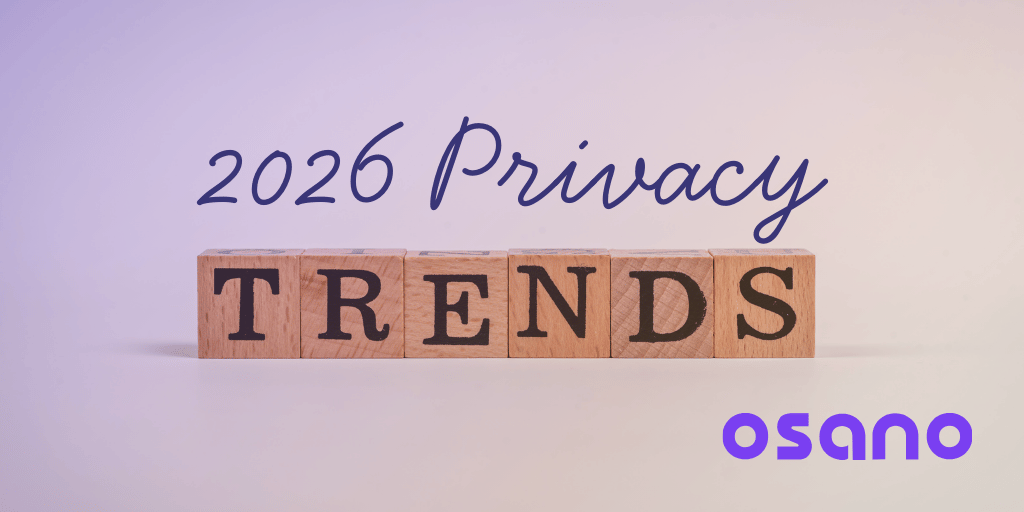Marketing has come a long way since the days when advertisements in newspapers, brochures, and billboards were a marketer’s primary means of connecting with their audience. The outbound marketing of the past held virtually no risk for prospect data. Marketers didn’t have access to it.
Now, marketers rely on marketing technology (martech) to connect with current and potential customers. The software and tools that make up a business’ martech stack collect data that marketers can use to build customer profiles and gain insights into their audiences. The result is a boost in the effectiveness of targeted marketing.
But with the increase in customer data comes an increase in responsibility. Legislation like the GDPR gives customers more rights over their personal information, and they want control of their data privacy. Marketing experts need to confirm that their martech stack is compliant or risk fines from regulatory organizations and loss of trust from current and potential customers.
You’ve probably spent time and money to ensure your website is compliant. Have you done the same for martech privacy? If not, this blog post will help you determine if your martech stack is compliant.
What is a martech stack?
Martech is the general term for the software solutions marketers use to reach their business goals. A martech stack is the specific combination of vendors used by a marketing department in their marketing efforts.
As of 2021, more than 9,500 martech solutions are available to industry professionals. Compare that to 2011, when there were only 150 different solutions on the market! Martech stacks include the tools businesses use to handle emails, automate social media, manage customer relationships, track analytics, and organize projects.
Martech falls into six categories:
- Advertising and promotion
- Commerce and sales
- Content and experience
- Data collection and analysis
- Project and workflow management
- Social and relationship management
Integrations between martech solutions enable marketers to receive unprecedented amounts of information. And while all of this information can be helpful, marketers must protect their prospect and customer data. Accounting for that added layer of complexity, however, can be easier said than done.
Martech privacy: Is your stack compliant?
Marketers are not only the brand champions of a business, but also the brand protectors. Not only can a data breach have devastating effects on an organization’s operations and reputation, but it can also uncover poor data privacy practices and potentially expose our organization to lawsuits. Thus, it’s essential that you thoroughly vet every martech solution before adding it to the brand’s stack. In fact, businesses can be fined for their vendors’ data privacy practices under certain circumstances.
How can you improve data privacy in marketing technology?
Audit existing and potential martech solutions
Are you aware of the customer data you share with every tool in your martech stack? Have you considered whether those partners share customer data with fourth and fifth parties?
When you work with personal data, the burden to protect that data falls on you. Privacy laws like the GDPR and CCPA/CPRA require companies to:
- Clearly explain what information is collected and how businesses use it
- Allow customers to view data held by the company
- Modify or permanently delete data at the request of a customer
Your business and the software you use must comply with these regulations if you’re welcoming visitors from the EU, California, or another region with data privacy laws. To understand where the risks lie and develop a plan to ensure compliance, complete an audit of your martech privacy practices. Determine:
- Which martech solutions your business uses
- Whether all the tools you use are essential for your business
- What data you’re sharing with each partner
- Whether your martech solutions share customer data with fourth parties
- How data is stored and used by martech solutions and any fourth parties
- How your organization shares opt-in, opt-out, modification, and delete requests with your partners
Regularly confirm your martech stack’s compliance with data privacy laws
We’re in the midst of the data privacy revolution. Laws are changing all the time, and it’s up to you to make sure your organization and the organizations you share data with adhere to those laws. To stay up to date after the initial audit, set regular check-ins to:
- Review the latest privacy legislation
- Evaluate new marketing initiatives for additional types of data collected
- Track martech privacy changes
A vendor may pass your initial screening, but a change in their practices or standing can impact your business. For instance, if your vendor is embroiled in a lawsuit that puts them out of business, you’ll be left scrambling to find a new vendor and securely transfer customer data.
Implement custom privacy solutions to secure customer data
Now that you understand how you’re sharing data with your martech solutions and their partners, you can enforce customized privacy solutions that enables compliance. You should tailor your privacy solutions to each customer, depending on their location, residency, and preferences.
Use Osano’s vendor risk monitoring to learn about your martech stack
Monitoring your vendors and staying up-to-date with changing privacy laws can be a full-time job. If you’d rather spend your time connecting with current and potential clients, the team at Osano can help.
Osano’s attorneys monitor the privacy policies of more than 14,000 vendors to let you know who’s doing privacy well and who’s putting your company at risk. Our Vendor Risk Monitoring platform tracks changes, alerts you to risky vendors, and follows the data to discover risks introduced by fourth parties.
What happens when something goes wrong with a vendor after they’ve passed all your security checks? Would you know if your vendors were involved in a lawsuit? Osano’s Vendor Lawsuit Alerts functions like Google Alerts for the courtroom. We’ll let you know when one of your vendors is engaged in a lawsuit and will help you quantify the risk. These alerts will help you determine whether you need to change vendors long before receiving a shutdown notice from your martech solution.
Stay on top of your vendors with help from Osano. Sign up for a free 30-day trial to see how our Vendor Risk Monitoring and Vendor Lawsuit Alerts can make martech privacy a breeze.
U.S. Data Privacy Checklist
Stay up to date with U.S. data privacy laws and requirements.
Download Your Copy
Osano Staff
Osano Staff
Osano Staff is pseudonym used by team members when authorship may not be relevant. Osanians are a diverse team of free thinkers who enjoy working as part of a distributed team with the common goal of working to make a more transparent internet.
.webp?width=1220&height=1090&name=Osano-guarantee-seal%20(1).webp)



